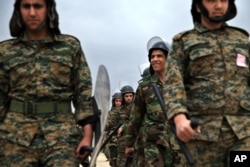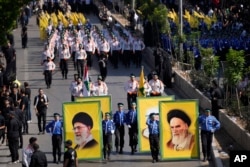On August 17, Iran’s Supreme Leader Ayatollah Ali Khamenei met the Supreme Assembly of Commanders of the Islamic Revolutionary Guard Corps (IRGC)— the Islamic Republic’s top military force.
Khamenei dismissed what he called efforts to tarnish the IRGC’s reputation through “false news, rumors and all kinds of tricks and ploys”:
"After about four decades, we have a huge and fully equipped defense and military center, we have the largest anti-terrorist organization in the world. Today, the IRGC is the largest anti-terrorist organization in the world.”
That is false.
Bahrain, Saudi Arabia, Sweden and the United States have designated the IRGC as a terrorist organization. The European Union, which has sanctioned the IRGC for years over its ‘malign activities’ — designed to sow discord, manipulate public information or disrupt markets — is also considering adding the IRGC to its list of designated terrorist organizations.
Established in the wake of Iran’s 1979 revolution, the IRGC is a branch of the Iranian armed forces, with its own army, navy, air force and intelligence agency. The IRGC is independent from Iran’s regular army, and is tasked with protecting the country’s Islamic system.
In 2007, the U.S. Treasury Department designated the IRGC’s “external operations arm,” the IRGC-Quds Force, as a terrorist organization for providing material support to the Taliban “and other terrorist organizations.”
The U.S. State Department’s Bureau of Counterterrorism called the IRGC-Quds Force “Iran’s primary mechanism for cultivating and supporting terrorist activity abroad.”
In 2019, the United States designated the IRGC in its entirety as a Foreign Terrorist Organization — “the first time that the United States has ever named a part of another government as an FTO.”
In June, the U.S. Treasury Department sanctioned IRGC members and affiliates it accused of participating “in a series of terrorist plots including assassination plots” targeting former United States government officials, dual U.S. and Iranian nationals, Iranian dissidents, journalists, activists “and others who oppose the abuses and human rights violations perpetrated by the Iranian regime.”
As Shiite Islam is the Islamic Republic’s official religion, the IRGC has a track record of supporting Shiite militant groups across the Middle East and engaging in proxy wars against regional rivals Israel and Saudi Arabia.
Experts say Iran has created a so-called “axis of resistance,” which by some counts entails over 100 Shiite militias supported by the IRGC’s Qud forces operating in Afghanistan, Iraq, Lebanon, Palestine, Lebanon, Syria, Yemen and beyond.
In Iraq, Iran provided U.S.-designated terrorist groups, including Kata’ib Hizballah, Harakat al-Nujaba and Asa’ib Ahl al-Haq, with training, funding, logistic support, weapons and operational influence.
The IRGC’s Qud forces provided explosively formed projectile (EFP) training and logistics to Shiite militant groups for carrying out deadly attacks. Iran proxy forces are estimated to have contributed to one-sixth of all U.S. combat deaths in Iraq.
In Yemen, which has been embroiled in a nearly decade-long civil war, the IRGC has reportedly provided Houthi rebels with advanced weapons, training through military advisers and other support.
The Houthis have repeatedly attacked Saudi Arabian oil infrastructure, civilian targets on the Arabian peninsula, U.S. facilities and personnel in the region, and have launched indiscriminate attacks on Yemeni civilians.
A report from the Norwegian Shipowners’ Mutual War Risks Insurance Association said the IRGC are “highly likely” to have facilitated attacks on four tankers, including two Saudi ships, off Fujairah in the United Arab Emirates, in 2019.
For decades, Iran has supported Hezbollah, a Shiite Muslim political party and militant group based in Lebanon, whose military wing is more powerful than the Lebanese army. Hezbollah has been implicated in a raft of terrorist attacks at home and abroad, including plane hijackings, assassinations, embassy bombings and suicide attacks.
Hezbollah has been instrumental in the decades long Iran–Israel proxy conflict and the Israel-Lebanon conflict, including the 2006 Lebanon War, during which it launched indiscriminate attacks against civilians.
In 2020, the U.S. State Department estimated Iran had provided Hezbollah $700 million a year in funding.
In neighboring Syria, where Tehran’s support has been critical in propping up the dictatorship of Bashar al-Assad, Iran operates via a number of proxies.
The IRGC has funded, supplied and commanded Liwa Fatemiyoun, a Shiite militia composed of Afghan recruits fighting alongside Syrian government forces. The United States and Canada have designated Liwa Fatemiyounn as a terrorist organization.
The IRGC also formed a group called Liwa Zainebiyoun, composed of Pakistani Shiite militants, to fight in Syria.
Another group, Liwa al-Quds - composed largely of Sunni, not Shiite, Palestinians - was described by the Syrian news website Zaman Al Wasl as “a Sunni face of [Iran’s] al-Quds battalion.”
IRGC’s Qud forces have also been deployed on the front lines in Syria, where Hezbollah has also taken part in combat operations.
In the Palestinian territories, Iran supports Islamic Jihad, which Israel, some European countries and the United States have designated as a terrorist organization. The group operates in the Israeli-occupied West Bank and has a growing presence in the Gaza Strip, which is governed by the militant group Hamas. Iran also provides Hamas with weapons, funding and training.
In Iran itself, the IRGC has been instrumental in violently cracking down on demonstrations, including those sparked by the death of Mahsa Amini in police custody in September 2022.
The U.S. Treasury said the IRGC played “a leading role in suppressing protests through extensive human rights abuses.”







